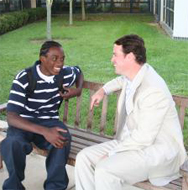


 |
 |
 |
|||||||||||
|
|
|
||||||||||||
|
|
|
|
|
|
|
|
|
|
|
|
|||
|
|
|
|
|
|
|
|
|
|
|
|
|
|
|

|
BBBS of Middle Tennessee Develops Best Practices for Statewide
MCP “When you have a statewide partnership and you’re talking to a state entity, it’s very attractive for them to know that they could talk to one contact and it can get implemented statewide,” says Lisbeth Couser, vice president of marketing development for BBBS of Middle Tennessee. “They like that; it saves them time.” In addition, the partnership can be a powerful negotiating tool when seeking state funding. “We have the attention [of the commissioner of the Tennessee Department of Corrections] and we are trying to get in his budget as a line item,” says Couser. BBBS of Middle Tennessee is partnered with five other such agencies in the state. This accounts for all of the state’s Big Brothers Big Sisters agencies with the exception of BBBS of Knoxville, which had previously committed to working with another MCP program in the state prior to being asked to join the partnership. BBBS of Middle Tennessee retains $100,000 of the $1 million federal grant to cover administrative costs and uses the remaining funds to reimburse for matches. Originally, each BBBS agency received $1,200 per match, but HHS recently reduced the amount to $1,000, according to Couser. Now that the MCP program is in its third year, each agency is clear on their responsibilities, but it took a lot of planning and readjusting to get to this point. “We did a lot of upfront work trying to think about how that program would roll out,” says Couser. “When we applied for the grant we probably discussed it for three months on how the program would be delivered and who the partners would be.” However, despite signed MOUs with external nonprofit partners, by the time the grant period began, many things had already changed, like staff changes in external agencies. For example, “in Nashville we had a partnership with Family & Children’s Services to receive referrals from them for children that needed to be served,” says Couser. “But when [we] received money, the people that we had signed the MOU with were not there; they had changed jobs.” In addition there had been staff replacements at BBBS of Middle Tennessee. All these changes meant renegotiating expectations for the partnership and getting everyone on the same page. Looking back, the only thing Couser would have tried to do differently is “try to use the funding as leverage against each other so you can get people more involved and excited about the project,” she says. For instance, “if we’re applying to HHS to serve these children then go to the state Department of Corrections and say ‘look we want you to step up to the plate and put us in your budget to receive some money and let us put that in our budget for this statewide partnership.’” Couser advises
other agencies interested in forming a similar partnership to connect
with existing statewide programs to understand best practices. “It’s
a really important program and we have to get these kids served.” Winter
2006 |